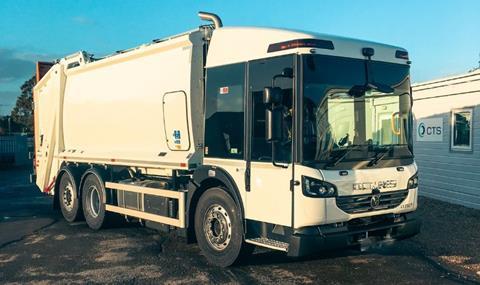
Municipal vehicle hire company CTS Hire has purchased 10 new diesel-powered refuse collection vehicles (RCVs), as demand for electric powered RCVs continues to be weak.
The company, which is celebrating its 30th year in business, has a fleet of over 2,000 vehicles of which 800 are diesel-powered RCVs and just five are electric RCVs.
CTS Hire is keen to promote electric RCVs, recently launching a three month trial of two electric RCVs to give councils a chance to properly evaluate the vehicles before committing long term.
The company said it is enthusiastic about alternative fuel vehicles and is playing a significant role in enabling councils to trial electric vehicle technology so that they can make informed choices before making long term commitments.
However, despite an enthusiastic response from councils, demand for electric RCVs currently remains sluggish due to a number of factors.
Speaking to MT, MD Bob Sweetland said: “Take-up of electric RCVs has been much slower than we anticipated and definitely slower than manufacturers anticipated.
“Currently we have three electric RCVs on long term hire with one council and one on order and we are in talks with another. We have five electric RCVs on our fleet and that is a long way from where we thought we would be, given the political pressure on councils to make the transition.”
Sweetland said take-up is being hampered by a number of factors, including range, particularly for those councils that have long distance, rural routes.
In addition the comparative lack of power of electric RCVs can also pose challenges for those local authorities with hilly routes, whilst the electric RCVs maximum speed of 35 mph makes it unsuitable for councils which require their RCVs to use motorways on route.
Sweetland added: “Infrastructure is another huge issue for many councils. A lot of local authorities have relatively old depots and finding a practical and cost effective way to get power into those site can be very difficult. The cost of getting power to a site can be as much as £1m.”
Another major barrier to cash-strapped councils is the price of electric RCVs. Whereas a standard diesel RCV comes in at around £200,000, a comparative electric RCV can cost around £450,000.
“Affordability is a problem, particularly in the current economic climate,” Sweetland said, adding: “We recently supplied a diesel RCV fleet to a new customer and the decision came down to cost, because to take an electric RCV fleet would have required an additional £2.5m of capital cost and that was just not affordable under their current budget.”
Nonetheless Sweetland is confident demand for electric RCVs will grow, albeit more slowly than first expected.
“The products need to get better – and that will happen. Progress is being made all the time. Once they have a better top speed and more power they will become a much more attractive proposition – and the drivers and crews really like them because they are so much more pleasant to drive,” he added.
Sweetland would also like to see more government incentives to help boost demand. “If they made more funding available to councils and helped with the cost of infrastructure then that would overcome a lot of the barriers, “ he commented.
In the meantime CTS Hire customers can consider hiring diesel RCVs and powering them with HVO as a way of cutting emissions without the expense of transitioning to electric RCVs, Sweetland advises.
The ten new diesel RCVs that have just landed at CTS Hire are a combination of Dennis Eagle Elite narrow and standard width 18t and 26t refuse vehicles, including four twin packs.
All the vehicles are fitted with Terberg automatic split bin lifts and are FORS compliant equipped with 360° camera systems and tracking technology.
Sweetland said: “This is a major fleet investment and signifies further growth for CTS Hire. It is also a demonstration of our commitment to maintain a high proportion of new vehicles within our rental stock.
“We want our customers to benefit from the very latest vehicle technology. These vehicles feature lower emission Euro 6 engines and are fully equipped with safety and tracking technology.”













